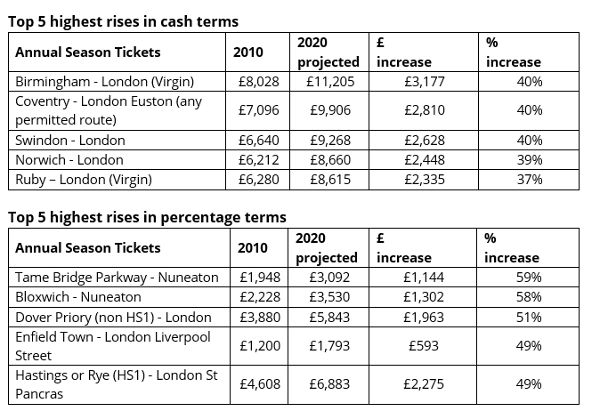Rail fares for season ticket holders are set to rise by 2.8% in January, based on the Retail Prices Index (RPI) measure for July, which was announced on Wedneday.
Some commuters could see a price hike of more than £100 on their season tickets, and the average commuter will now face paying £3,064 a year, 40% more than in 2010.
The announcement has once again provoked a debate over how the price rise for regulated fares should be monitored, as well as how they should be run.

Source: Labour
The price of regulated fares, including season tickets, is controlled by governments. These fares account for around 45% of ticket sales while the rest of tickets, including advance and peak long-distance tickets, can be increased at train companies' discretion.
The amount private operators can increase regulated fares is based on the higher inflation rate of RPI - 2.8% for July - despite the fact the Government's preferred measure for inflation is the lower Consumer Prices Index (CPI), which has a rate 2.1% for July.
In England, the Department for Transport caps increases at RPI, Transport Scotland keeps regulated fares at July's RPI except for off-peak fares which are capped at RPI plus 1% and in Wales regulated rail fares are capped at the rate of RPI.
The passenger watchdog, Transport Focus supported calls for the switch to make regulated fares be pegged to CPI.
David Sidebottom, director at Transport Focus, said: 'After a year of more stable – but still patchy – rail performance many rail passengers will be mystified that rail fares should be going up at all, let alone by 2.8% next January.
'The National Rail Passenger Survey shows that less than one third (30%) of rail commuters are satisfied with the value for money of their ticket. Transport Focus believes it’s time for a fairer, clearer fares formula based on calculations that use the Consumer Prices Index, rather than the discredited Retail Price Index.”
'After recent disruption and a lot of misery over last winter, rail operators still have a great deal to improve. To help focus their efforts it is vital that passengers ‘make delay pay’ by claiming every time for any compensation they are due.'
Darren Shirley, Chief Executive of Campaign for Better Transport, said: 'Passengers already pay thousands of pounds to endure overcrowding, delays and cancellations. It’s time to stop the rhetoric on fare increases. The Government should commit to January’s fares rise being linked to CPI and a comprehensive package of rail fare reforms should follow after the Rail Review is complete.'
Andy McDonald MP, Labour’s shadow transport secretary, said: 'The government has sat back and allowed private train companies to cash in while people’s pay has been held back. Continuous fare rises undermine urgent action to tackle the climate emergency by pricing people off the railways.
'Labour will bring our railways into public ownership so they are run in the interests of passengers, not private profit.'
To coincide with confirmation of the 2.8% train fares hike today, Labour compared the costs on over 180 train routes between 2010 and the projected new prices that will be implemented this January 2020.
The figures show:
- Average fares will rise to 40% more than they were in 2010
- That some commuters will be paying over £3,000 more to travel to work than in 2010
- The highest increase is projected to be on a Virgin Trains season ticket between Birmingham and London Euston which will have risen by £3,188 since 2010 and now costs £11,205
- The biggest percentage increase identified was between Thame Bridge Parkway near Walsall and Nuneaton, where the cost of an annual season ticket will have risen by 59% since 2010
- In Boris Johnson’s constituency the cost of an annual season ticket from West Drayton to London Paddington has risen by £583 since 2010
- Average fares have risen nearly than three times faster than wages.
Robert Nisbet, director of nations and regions for the Rail Delivery Group, which represents train operators, said: 'Money from fares will continue to cover almost all of the day-to-day costs of running rail services. This means private sector and taxpayer money can go towards improving services for the long term.
'Rail users across the country are already seeing and feeling the benefits of this investment with new trains and more services running across the country.
'People want simpler, better value fares and we want to work with government to deliver our proposals for reforming today’s outdated system to make fares easier for all.'
Register now for full access
Register just once to get unrestricted, real-time coverage of the issues and challenges facing UK transport and highways engineers.
Full website content includes the latest news, exclusive commentary from leading industry figures and detailed topical analysis of the highways, transportation, environment and place-shaping sectors.
Use the link below to register your details for full, free access.
Already a registered? Login